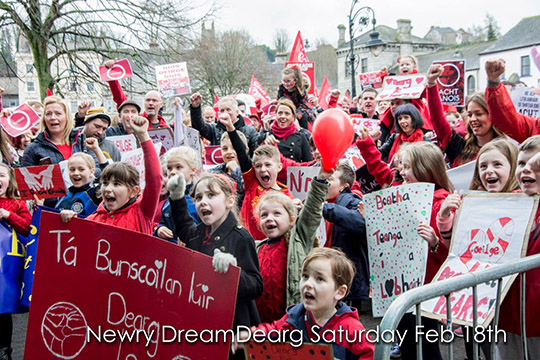Hundreds of people, families and local Irish-language students gathered outside Newry town hall (Saturday 18 February) as part of a public demonstration calling for an Irish Language Act.
The event, organised by Irish Language movement An Dream Dearg, an open and inclusive campaign for all, came to Newry to call for respect, recognition and rights for the Irish-language community through the provision of rights-based legislation in the form of an Irish-language Act.
Aoife Nic Con Midhe, local spokesperson for An Dream Dearg said: “As the election draws near, it is important for the Irish language community to be as vocal as possible. The failure of Stormont to deliver on promises made to us makes it imperative that our rights are delivered prior to the resurrection of any executive.

“The continued intransigence and opposition of political unionism, reiterated again recently, illustrates the impossibly of this being resolved locally. Our rights cannot be held hostage to ‘political consensus’ and we call on all political parties who support us to affirm their commitment that they will not be part of any future arrangement that facilitates the active discrimination of Irish speakers.’
Sara Ní Chuireáin from South-Down Irish language community said: “Our community is vibrant, inclusive and growing. The state must remove the obstacles and give us the respect and recognition we deserve. This can only be delivered through the provision of rights.
“We have learnt recently, in this area, of the intervention of our former first minister to prevent the erection of bilingual signs, in contravention of the expressed wishes of the local community. This highlights the need for legislative protection. We will continue to agitate and organise until our rights are delivered. We ask all of those who support an inclusive, respectful society where diversity is celebrated to stand with us. There can be no return to the status quo.”
POBAL, the umbrella advocacy group for the Irish speaking community in the North and the group which has spearheaded the campaign for the Irish language Act for over twelve years, has said that Irish speakers in County Down and the surrounding area deserve to see the language protected.
Janet Muller, POBAL’s Director said: ‘Today promises to be an exciting day, when people of all ages from Newry, Armagh and Down will give the message – no return to government without the Irish language Act.”

And Sinn Féin have backed the demand for an Irish Language Act. This will certainly be one of the political hot potatoes coming up to the March 2 election as the DUP has rejected the idea of such an act and may likely partner Sinn Féin in government (if both parties stake first and second places.)
Janet Muller added: “At today’s event, POBAL is supporting local people in the march in Newry to call for the Irish Language Act. Ten years ago, the British government made a promise in the St Andrews Agreement to introduce legislation and we do not think the people of this area, or any part of the North, should have to wait any longer.
“A whole generation of school children have gone through pre-school and primary education in Newry, Armagh and Down waiting for the politicians to come to agreement on this. Now the Assembly has fallen, and POBAL is calling for a commitment from the nationalist parties that they will not return to government without an unbreakable guarantee that the Irish language Act will be brought in within an agreed time scale.
“The British and Irish governments were both signatories to the St Andrews Agreement and they must now work together to resolve this outstanding issue since it is clear that the DUP is unable or unwilling to treat the Irish speaking community with respect and equality.”
POBAL has spearheaded the campaign for the Irish language Act since 2004. It has drafted expert proposals for the contents of the Act (POBAL: Acht na Gaeilge TÉ Eis II:
www.pobal.org/uploads/images/Acht%20na%20Gaeilge%202012.pdf)
and their model has been supported overwhelmingly by in excess of 95% of respondents in government-run consultations in 2007 and 2014.
























